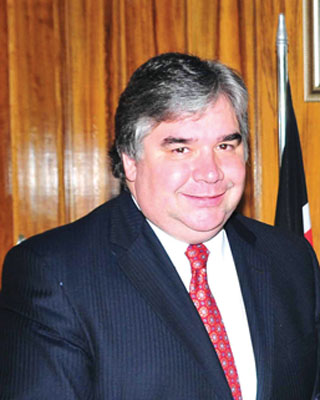 Background
Background Minister Van Loan
Discusses Talks Toward a
The
New Pathway’s John Pidkowich recently interviewed Canadian
International Trade Minister, the Hon. Peter Van Loan, PC, MP for York – Simcoe
about the current level of official free trade discussions between
 Background
Background
On
JP: Minister Van Loan, can
you state who and from which government department is speaking on the behalf of
PVL: I,
as
JP: Within free trade
talks, which industry sectors or spheres of economic activity are being talked
about?
PVL: At
the start of the process, it’s just about everything, both services and
merchandise trade. We begin to figure out where we have the greatest prospects
for success. Normally, what happens is that each side identifies sectors that
they’re interested in and those that are defensive issues, sectors that they
might wish to protect. Then, negotiations proceed [and] at this point it’s
still wide open.
A free trade agreement with
Ukraine could further open markets for Canadian exports including agricultural,
fish and seafood, and pharmaceutical products, machinery, meat (frozen pork),
electrical and electronic equipment, and iron and steel products.
In keeping with
JP: Do you know what the
value of trade is between
PVL: It’s
usually somewhere in the range of $225 million annually. It’s fairly balanced.
Last year, everybody experienced an economic downturn. In 2009,
By province,
JP: Can you state the value
of Canadian direct foreign investment in
PVL: The stock of Canadian
direct investment in
JP: Are there any special
business conditions [or incentives] that
PVL: I
think that the greatest benefit for an agreement like this would be that we
have such a significant expatriate Ukrainian population in
JP: Is the liberalization
of Canadian visa requirements for Ukrainians an area of negotiation?
PVL:
Generally speaking, visas and the requirements for visas are the purview of the
Minister of Citizenship and Immigration. For example, as with the European
Union, trade discussions also include labour mobility, particularly allowing
temporary mobility, expedited on a (visa) basis in terms of being able to work.
This is a little bit different than having to get a work visa for investors,
for management trainees, for skilled people important for a particular
business. So, a trade agreement could set up a work/labour mobility arrangement
but obviously they are speculative at this stage [of negotiations]. However,
this has been done in the past and is currently the subject of negotiations
that we have with other free trade agreements.
JP: What role does a
business forum, such as the
PVL:
The key is, of course, who are the people involved, and what are their
inclinations and interests. Such forums can be tremendously helpful, especially
for smaller entrepreneurs or business people looking to make a move to invest
or set up operations to trade overseas. For bigger businesses, the expense of
start-up is easily managed within the broader context of overall budget. For a
smaller business, often there is a bigger challenge [associated] with
transaction costs. So, forums are very good for the sharing of knowledge,
making contacts, and also for the trade commissioner service that
JP: Has the new Government
of
PVL: We
were hoping to begin these free trade talks sooner and with the change in
administration there was a bit of a delay but now basically on track and going
ahead.
We are pleased with
PHOTO
Canadian International Trade Minister, the Hon. Peter Van
Loan